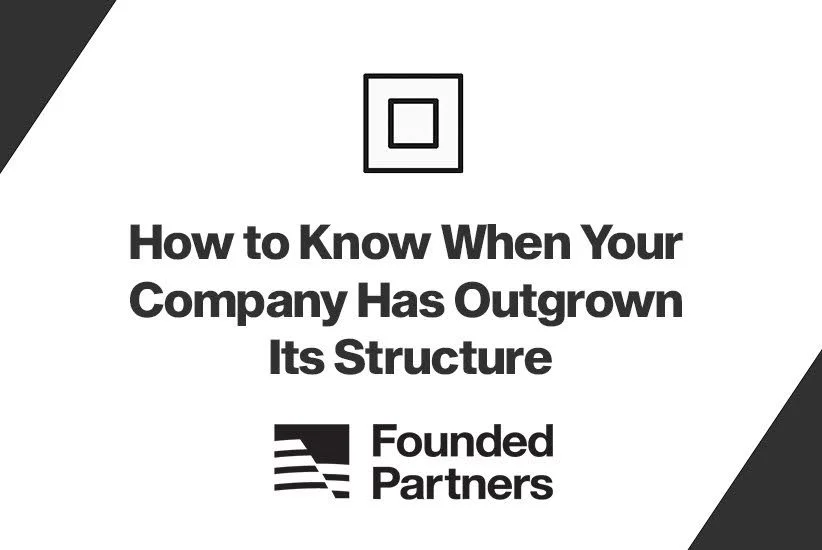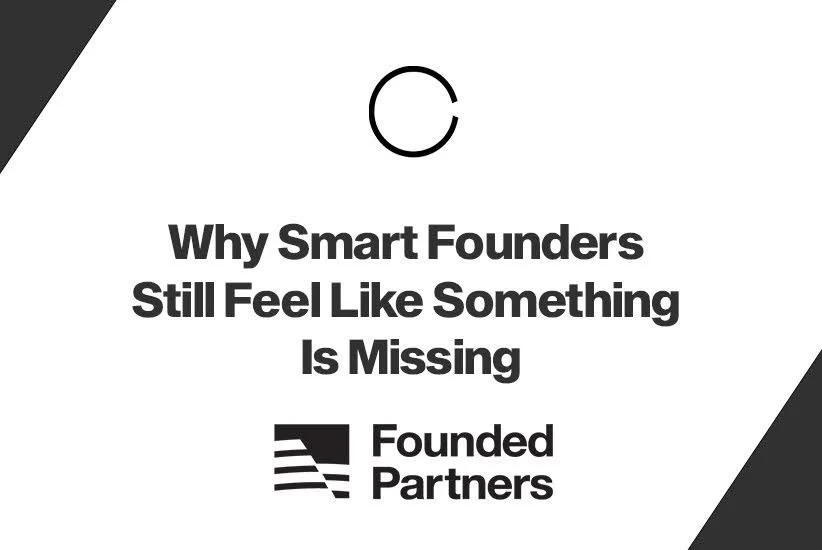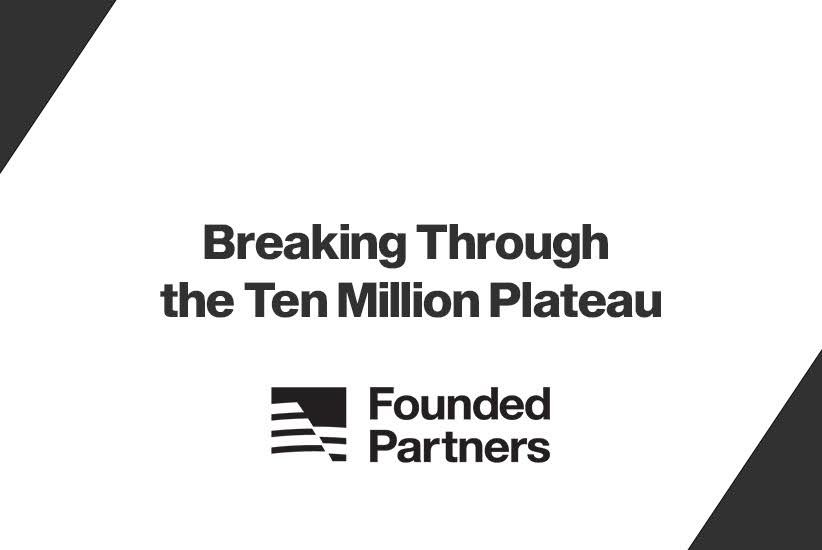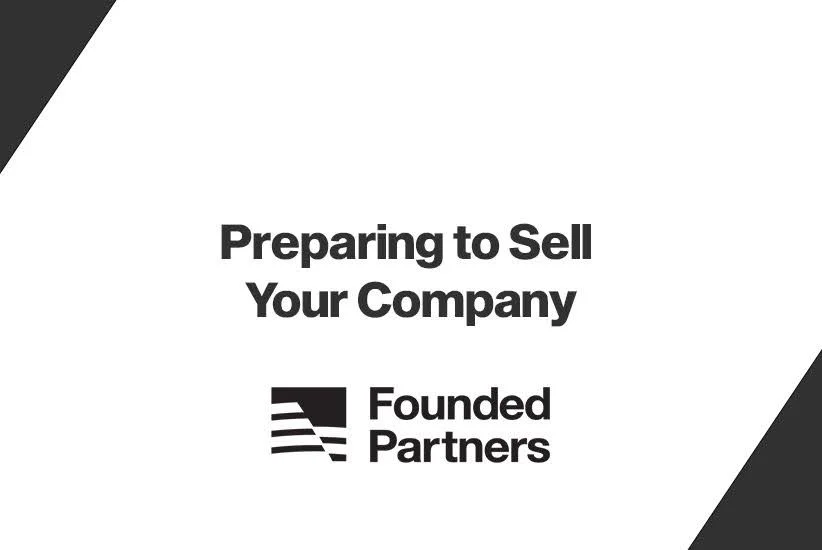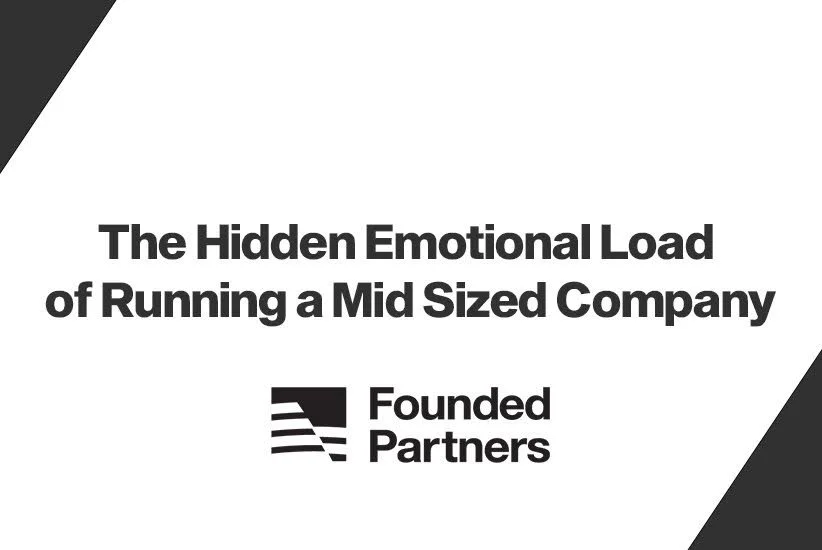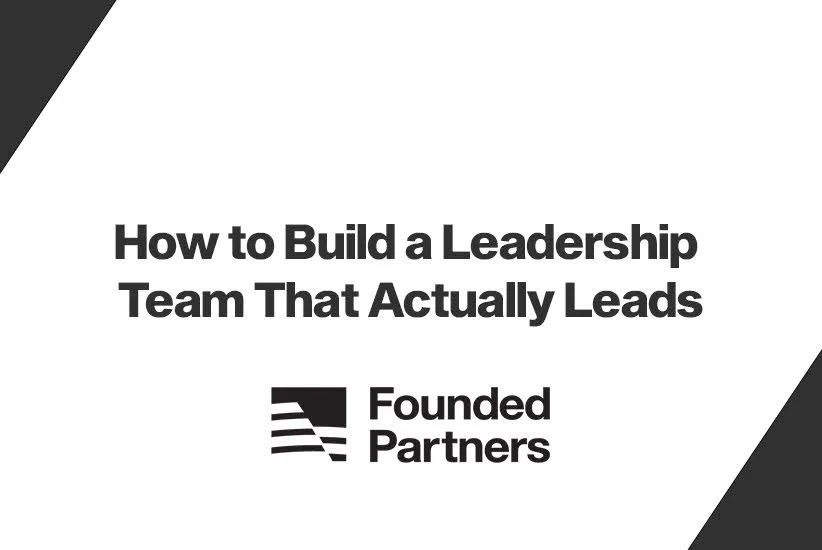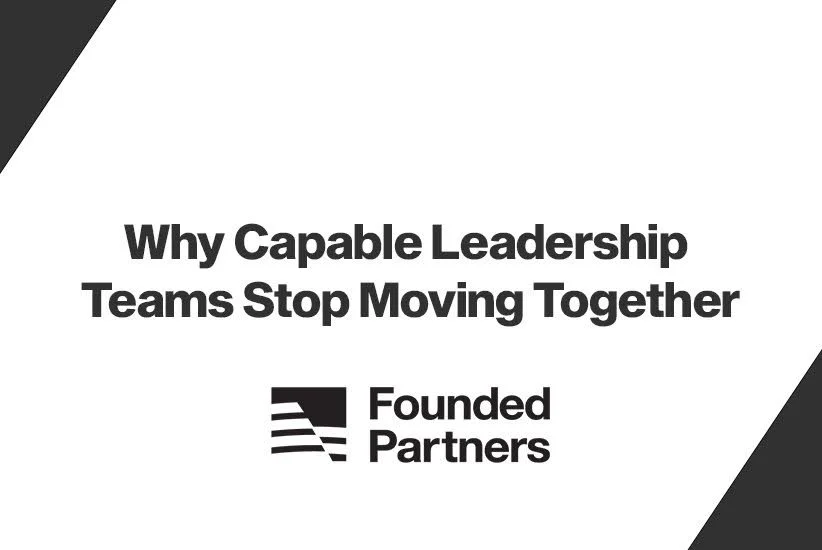Welcome to the Founded Partners Blog
Expert Insights for Founders & Growing Businesses
At Founded Partners, we help founder-led companies in the lower middle market navigate growth, leadership, and strategic decision-making. Our insights are built on real-world experience, blending business psychology, execution support, and capital-raising strategy to help businesses scale effectively.
What You’ll Find Here
This space is dedicated to founders, executives, and business leaders looking for expert guidance on:
Strategic growth and execution support – Turning decisions into action and scaling operations effectively.
Leadership and team development – Building high-performing teams and fostering a resilient company culture.
Capital raising and financial strategy – Preparing for funding rounds, optimizing valuation, and structuring ownership
Founder psychology and mindset – Strengthening decision-making, overcoming doubt, and adapting to change.
Beyond Strategy: The Founded Partners Approach
We go beyond traditional business consulting by offering independent advisory services that integrate execution support and psychologically informed strategies. Whether you’re scaling, restructuring, or preparing for an exit, our expertise helps ensure that your business thrives at every stage.
Stay Connected & Keep Learning
Looking to strengthen your decision-making, execution, and growth strategy? Get in touch to explore how we can support your business. Want insights tailored to your challenges? Let us know what topics matter most to you.
How to Know When Your Company Has Outgrown Its Structure
Every company begins with a simple structure because simplicity is what early growth requires with people wearing many hats, fast decisions, and informal communication, but as the company grows this early structure begins to stretch as teams expand, work becomes more complex, the founder steps back from details, and decisions multiply. Without meaning to the company moves into a stage where the old structure no longer fits the new reality, and this does not happen all at once but shows up quietly at first with most founders feeling it before they can explain it. If your company is between five million and fifty million in annual revenue you may already be sensing the early signs that the structure needs to evolve through slower decisions, busy but misaligned leaders, the founder becoming the quiet fallback for everything, expanded roles without redesign, operational friction across departments, and growth requiring more energy than before.
Why Smart Founders Still Feel Like Something Is Missing
From the outside a growing company looks strong with healthy revenue, capable teams, and satisfied customers, yet many founders reach a stage where despite the progress something does not feel complete, creating a quiet sense that something important is missing. This feeling is subtle because it is not burnout, dissatisfaction, or doubt in the company but rather a signal that the company is ready to evolve into a more mature form of leadership and structure. Founders often describe it as knowing they are successful but feeling like they could be more focused, doing well yet not fully at ease, or watching the business grow without feeling the clarity they want as a leader. This experience is far more common than most founders realise and often appears when the founder can sense the next stage approaching even if the business has not fully caught up, making this feeling not a warning but an early insight and a gift.
Breaking Through the Ten Million Plateau
Many companies reach a stage where growth slows down even though the business is healthy because sales continue but momentum feels different, the team is busy yet progress feels harder, and the founder feels pressure to push the company forward but cannot always see what is holding it back. If your company is between ten million and fifty million in annual revenue and growth feels heavier than it should you are not alone because this plateau is one of the most common stages in founder led businesses. It does not mean the company is underperforming but means the company has reached a new level of complexity where growth at this stage is less about effort and more about structure, clarity, and leadership maturity, and once these elements are in place the business can move forward again with confidence through realigned priorities, strengthened operations, and reduced dependence on the founder.
Preparing to Sell Your Company
Most founders start thinking about a sale long before they tell anyone because it usually begins as a quiet thought that comes from feeling stretched, desiring stability or a new chapter, or seeing a market opportunity that may not come again. Whatever the reason, the early stages of preparing for a sale look more like reflection than transaction and require clarity, structure, and support before they require a buyer. If you are starting to wonder what a sale might look like or whether your company is ready you are not alone because many companies between five million and fifty million in annual revenue reach this moment as a natural stage in the life of a business and a normal part of the founder journey, where preparing to sell is not about rushing into a transaction but understanding the company clearly and shaping it so you have real choice in the future.
The Hidden Emotional Load of Running a Mid Sized Company
Founders of mid-sized companies carry a weight that rarely shows up in board meetings or financial reports. As your business scales from $5M to $50M, the pressure changes—it becomes broader, quieter, and more complex. More people depend on you. The stakes increase. Yet you have fewer people to confide in. This emotional load isn't a sign of struggle—it's a sign you're leading at scale. Here's why it happens and what actually helps.
How to Build a Leadership Team That Actually Leads
As companies grow many founders reach a point where they want their leadership team to take on more responsibility with clearer ownership, stronger decision making, and real support at the top of the organisation, yet even with talented people in place the team does not always rise in the way the founder hopes. This is not because the team lacks ability but because the business has reached a stage where leadership needs to mature from individual effort to shared direction, and building a leadership team that actually leads is one of the most important transitions in a growing company because it reduces pressure on the founder, improves performance, strengthens culture, and helps the company grow into its next stage with confidence through shared clarity on priorities, real ownership of outcomes, simple leadership rhythms, trust and direct communication, capability development, and intentional redefinition of the founder's role.
Why Capable Leadership Teams Stop Moving Together
Most leadership teams are made up of capable people who care about the company and want to do the right thing, yet even strong teams eventually reach a point where they stop moving together as progress slows, priorities become unclear, decisions feel heavier than before, and tension builds in ways that are subtle rather than dramatic. This misalignment does not happen because someone is underperforming but because the company has grown, and businesses between five million and fifty million in annual revenue enter a stage where the work expands faster than the systems that support shared leadership. Roles evolve, expectations shift, and decisions multiply, so without meaning to the leadership team begins to operate from different assumptions, creating drift that is normal, predictable, and fixable once you understand the forces creating it and implement the right realignment process.
When Everything Depends on the Founder
Most founders reach a moment in their journey when the business begins to depend on them in a way that feels heavier than before because decisions come back to you, problems rise to you, the team waits for direction even when they are capable, and you feel the pressure to hold everything together and keep momentum strong. This is not a failure but a stage of growth where companies between five million and fifty million in annual revenue experience this exact shift as the work becomes more complex, the leadership team becomes busier, and the business expands faster than the systems that support it. Without meaning to, the founder becomes the centre of every major decision, not because the founder is doing anything wrong but because the structure has not evolved with the scale of the company, creating a bottleneck that affects both team performance and founder.
Why Leadership Teams Drift Out of Alignment and How to Bring Them Back Together
Most leadership teams do not fall out of alignment because of conflict or lack of effort but because they drift as the business grows, the work becomes more complex, and everyone tries to do the right thing yet slowly moves in different directions. If you lead a company between five million and fifty million in annual revenue, this is almost a predictable stage where founders tell us the same thing in different words like our team is strong but we are not working as one, I feel like I am holding everything together, or we are growing but the business feels heavier than it should. This experience is common and completely normal, and it is also fixable because the drift happens when teams expand, roles blur, departments form, new leaders join, and people rely on old habits even though the business has outgrown them, with no one causing it but the structure simply needing to evolve.
Founder Coaching vs Fixing: How Leaders Accidentally Limit Team Growth
Founders are wired to solve problems, and it is one of the traits that helps them build companies in the first place, yet the same instinct that drives early success can quietly limit team growth as the business scales because psychology research shows that when leaders step in to fix problems instead of coaching through them, they unintentionally reduce autonomy, weaken confidence, and slow the development of the people they depend on most. At Founded Partners, we see this pattern repeatedly where a founder sees something going off track, steps in to correct it, and the immediate result improves, but the long term effect is the opposite because the team does not learn, the founder becomes the bottleneck, and the culture begins to rely on crisis driven intervention instead of shared ownership, with most leaders not recognizing this dynamic because on the surface it looks like they are helping.
Raising Money: Seeding for Future Rounds
When founders talk about raising capital, they usually focus on the round in front of them, but the truth is that every round sets the stage for the next one, and if you only look at the money you need today, you may create real challenges when you go back to the market later. I learned this the hard way during our $150 million raise when an investor I called turned me down saying you are calling me at seventy five cents a share but where was my call at fifty, twenty five, or ten, making me realize we had closed earlier rounds with investors who could not support us in the next phase. We were starting from scratch at a moment when momentum mattered most because the best investors are not only writing cheques but shaping your story in the market, lending credibility, and helping you prepare for future rounds through warm conversations instead of cold calls.
Founder Never Giving Up
I recently had lunch with a successful entrepreneur who helped build a company that exited for about one hundred and fifty million dollars, and he told his team of ten that what he could promise and deliver was that he would never give up, seeing this as the single greatest value he brought to the table. That confidence speaks to something most founders feel about the promise to keep going when others would stop, and while perseverance can be the difference between progress and shutdown during uncertain markets, limited capital, and product struggles, there is a critical difference between quitting and changing direction. The commitment to never give up can help founders win, but it can also cause avoidable failure if applied without reflection because the most skilled founders learn when to push and when to pull, balancing determination with curiosity and remaining willing to update their thinking when new information arrives.
Understanding Cultural Dimensions: What Every Founder Should Know
When growing a company across regions or markets, founders often discover that success depends on more than strategy—it depends on culture. Drawing from Geert Hofstede’s landmark work on cultural dimensions, this post breaks down how national values shape workplace behaviour and offers clear steps founders can take to lead and scale effectively in a global environment.
Who Actually Invests in Private Companies?
When founders talk about “raising capital,” they often picture one kind of investor — but in reality, there’s a whole ecosystem of players who fund private companies at different stages of growth. From angels writing the first small cheques to private equity firms acquiring mature businesses, each group serves a distinct role in the journey from idea to exit. In this post, we break down who actually invests in private companies, when they get involved, and what they look for at every stage — from Seed to Series C and beyond.
Caring Makes You a Better Founder
I used to tell my coach that I wished I did not care what people think because I thought it would make me sharper and bolder, but then I noticed our best wins came when I listened first and decided clearly since caring helped the work move faster, helped people bring me bad news early, and helped customers tell us what to fix. The old stereotype of the successful CEO as cold, distant, and always right is dated and often wrong because high performing companies today depend on fast learning, cross functional work, and trust, which you cannot achieve without empathy. Empathy is not softness but skilled attention to the needs, signals, and limits of people so the work can move faster, leading to better decisions through access to more data and dissent, faster execution through real team buy in, stronger sales through understanding customer needs, and becoming a talent magnet where skilled people stay and contribute.
I was wrong about Founder Charisma
I was wrong about founder charisma because it can win a room, but it doesn't scale a company. During a recall crisis at Hydropothecary, standing in an empty greenhouse with scared team members asking hard questions, I realized they didn't need a show or a big speech but simple facts, real answers, and a clear plan. When people feel threat or uncertainty, the brain narrows and we don't process long messages well, so charisma creates attention while systems create behavior. After that greenhouse meeting, we focused on rhythm and trust through written plans, clear decision ownership, weekly operating rhythms, visible scoreboards, and psychological safety. The mood shifted from fear to focus, people knew the plan and could see progress, and leaders who were quiet before started to lead because charisma burns bright but rhythm and trust help you sleep.
The Hidden Costs of Being Indispensable as a Founder
I have lived both sides of founder dependency: being the co-founder that everything ran through, and also being the co-founder who looked around a strong executive table wondering what I was doing there because we had built so well that I went and got everyone lunch. Founder dependency occurs when operations, decisions, key relationships, and company identity rely too much on the founder, creating hidden costs including bottlenecked growth, strategic blindness from constant urgent decisions, talent drain as strong people leave when they cannot own outcomes, and significant valuation discounts of 10 to 25 percent due to key person risk. At Founded Partners, we help lower middle market, founder-led companies spot this dependency early and make a clean shift to stronger operating models that unlock growth, retain talent, and increase company value.
The Two Things Founders Want Most (But Rarely Ask For)
After meeting with over 120 founders, a clear pattern has emerged: the two things they want most aren't more capital or strategy—they want someone in the trenches with them, and they want honest, judgment-free feedback. In this post, we explore why those needs are so common in founder-led, lower middle market companies—and how Founder Advisory helps fill the gap with clarity, support, and results.
From Control to Influence: The Leadership Shift Founders Must Make After 20 Employees
There comes a moment in every founder-led business when growth no longer relies on hustle, instinct, or the founder's direct involvement in every decision, and that moment often arrives around the 20-employee mark when the company becomes a layered, complex system where old ways of working begin to show cracks. According to Larry Greiner's Organizational Growth Model, this is the "leadership crisis" where the founder's once-agile, hands-on style becomes a bottleneck that prevents scaling. What used to work now creates friction: decisions are slow, culture starts to drift, and founders feel stuck between doing everything and letting go of control. This isn't a failure but a natural and necessary shift where founders must evolve from control to influence, moving from being the center of gravity to being the force that shapes culture, strategy, and rhythm without micromanaging every detail.
Financial Readiness vs. Fundraising Readiness
Founders often conflate two essential but distinctly different aspects of running a business: financial readiness and fundraising readiness, and this confusion frequently results in unexpected delays, reduced valuations, or complete failure in securing investment. Financial readiness involves maintaining robust internal financial operations like clear accounting practices, healthy cash flow management, and accurate forecasting, while fundraising readiness means your business is prepared to withstand external scrutiny by potential investors through rigorous preparation of corporate documents, realistic financial models, and well-articulated growth strategies. The crucial difference lies in understanding that strong internal finances don't automatically translate to investor-ready presentation, and many founders discover this gap too late in the due diligence process when investors uncover organizational weaknesses that could have been addressed proactively.

